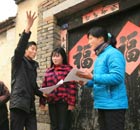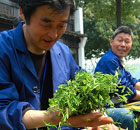Top Biz News
Toxic vegetables deal blow to region's goal
By Yan Jie (China Daily)
Updated: 2010-02-24 13:20
 |
Large Medium Small |
China's southernmost Hainan province has suffered a setback in its ambition to become a national vegetable supplier after traces of a highly toxic pesticide were found in vegetables grown in the province and sold in other regions.
A total of 3.5 tons of cowpeas from Hainan have been destroyed in Wuhan, capital of Central China's Hubei province, after sample tests carried out in two markets in the city showed that the cowpeas were tainted with a highly toxic pesticide named Isocarbophos, said a statement published on the website of the city's agriculture bureau late Monday.
The pesticide has been banned in the country from being used on plants such as vegetables, fruits, tea and tobacco.
Residues of the chemical found in the samples measured between 0.14 and 0.17 mg per kg of cowpeas, the statement said.
The bureau has also issued a three-month ban on sales of Hainan-grown cowpeas in the local market.
The local authority estimated that nearly 50 tons of the vegetable had been prevented from entering the local market as of Monday.
Authorities in Hainan usually run speed tests on samples of vegetables for the sake of freshness, said an official with Hainan's agriculture bureau surnamed Xing .
The tests failed to discover the pesticide residues in the cowpeas because the results would not appear positive if levels of the chemical stayed below one mg per kg of cowpeas, said Xing.
| ||||
Meanwhile, in Beijing, wholesale markets have started to check Hainan-grown cowpeas and by yesterday afternoon no toxic cowpeas had been found, according to local media reports.
Officers from Xinfadi market, a major vegetable wholesale market in Beijing, was quoted as saying that the tainted cowpeas found in Wuhan are from the Lingshui county of Hainan, while all cowpeas in the Xinfadi market come from the Ledong county of Hainan.
The setback in its ambition to help feed the nation came for Hainan after the central government had assigned it the role of serving as a vegetable-producing base when China's other regions are in winter.
Hainan, the country's only tropic province and a natural greenhouse, should play a bigger role in supplying vegetables for the country during the Chinese New Year and the "two sessions" period, when the nation holds a series of political conferences in March, Han Changfu, minister of agriculture, said during a visit to the province last month.
The province forecast last month that 2.7 million tons of vegetables, or three-fourths of the total output, would be sold to other regions in China during the winter period.











